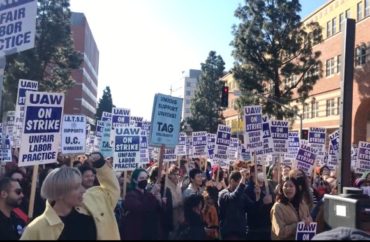
Academic workers obtained pay increases of between 20 and 80 percent
Weeks after University of California teaching assistants and other workers won major wage increases following a massive labor strike, the university system has considered cuts in graduate programs and department funding to pay for them.
The pay increases to workers “are among the highest ever granted in the nation’s universities,” the Los Angeles Times reported Jan. 27.
“The UC Office of the President estimates that the increased costs for salary, benefits and tuition across all 10 campuses will be between $500 million and $570 million over the life of the contracts,” according to the paper. Contracts run through May 2025 or later.
The workers won pay increases of between 20 and 80 percent, according to the paper.
Academic student employees will see their paychecks rise from approximately $23,250 to about $34,000 for nine months of part-time work by October 2024. Graduate student researchers will earn a minimum of $34,564 by that date.
Full-time postdoctoral scholars will see a salary increase from about $55,000 to $70,000 or higher by the end of the five-year contract, the paper reported.
However, the universities have not identified new monetary sources for the 2023-24 academic year to cover costs.
“UC Chief Financial Officer Nathan Brostrom told regents at their meeting this month that a ‘mismatch’ between rising labor costs, insufficient revenue to pay for them and inflation could tip campuses into budget deficits in coming years,” according to the LA Times.
More than 260 faculty at UCLA signed a letter opposing moves by the administration to draw funds from their departments, research centers, or faculty.
“Early indications across the UCLA campus suggest the university will seek to impose these costs on departments, research centers, and faculty PIs, leading to a reduction of graduate student appointments; an increase in the already high number of undergraduates per discussion section, and a correspondingly negative impact on course curriculum, undergraduate assignments, and grading,” the letter stated.
The expected redistribution of funds will also lead to “ultimately fewer funded research opportunities for graduate students,” it continued.
Instead, the faculty letter asked university leaders to reallocate investments and ask for more money from the state and federal governments, according to the LA Times.
Additionally, academic worker leaders objected to possible cuts in teaching assistants and graduate student admissions, the paper reported.
“In a survey by one of the unions representing the workers, graduate workers from 89 departments across all 10 campuses indicated that they had been informed of plans to reduce enrollment for the 2023-24 academic year,” according to the paper. “They also heard of plans to increase class sizes and shrink research groups.”
However, UCLA spokesman Bill Kisliuk said the university had not made any decisions on future graduate student enrollment.
UC strike was ‘the largest of its kind’ in the U.S.
Some 36,000 workers had demanded increased pay and benefits in a monthlong strike with participants at all 10 university system campuses, the “largest of its kind in the nation,” the Associated Press reported last December.
Striking workers said that they could not afford on their current salaries to live in major California cities where the universities are located, the AP reported.
The strikers, represented by two units of United Auto Workers, ratified a labor agreement on Dec. 19 that included significant salary hikes, child care, and additional supports, the LA Times reported last month.
MORE: Part-time faculty end three-week strike at university in New York
IMAGE: UC Student-Workers Union UAW 2865/Twitter
Like The College Fix on Facebook / Follow us on Twitter






Please join the conversation about our stories on Facebook, Twitter, Instagram, Reddit, MeWe, Rumble, Gab, Minds and Gettr.